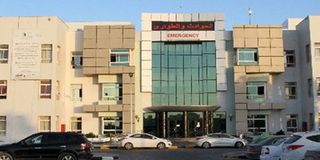Libya hospital overwhelmed by wounded in anti-IS fight

The accident and emergency entrance of the Central Hospital in Misrata where some pro-government fighters loyal to the Government of National Accord (GNA) injured in battles against Islamic State (IS) group jihadists in the eastern city of Sirte, are taken for treatment. PHOTO | AFP
What you need to know:
Most of the wounded end up at the hospital in Misrata, Libya's third city, located 190 kilometres (120 miles) from the front line.
Tripoli. (AFP) The entrance hall of Misrata's only hospital is crammed with beds reserved for fighters wounded in the battle to oust the Islamic State group from its crumbling Libyan stronghold Sirte.
Every day it receives dozens of casualties, many with severe shrapnel and bullet wounds, while also trying to serve Misrata's half a million residents.
The situation at Misrata Central Hospital is having a direct impact on the offensive, delaying a final push to retake Sirte from the jihadists, according to pro-government forces.
Equipped with just 120 beds and a reduced medical team, the hospital is desperate for more support.
"One day we treated 160 wounded," said hospital spokesman Akram Gliwan.
"Where should we put them? What should we do? We have to cope with the limited space and staff we've got."
Forces allied with Libya's Government of National Accord (GNA) — including Misrata's powerful militias — have been battling to clear the jihadists from their coastal stronghold since mid-May.
Pro-GNA forces entered Sirte on June 9 and have faced a barrage of sniper fire, suicide bombings and booby traps.
More than 350 pro-GNA fighters have been killed and nearly 2,000 wounded in the battle, according to medical sources.
Most of the wounded end up at the hospital in Misrata, Libya's third city, located 190 kilometres (120 miles) from the front line.
Prolonging the battle
Mohammed Abu Grin, 28, was hit by shrapnel when a mine blew up as his unit searched a booby-trapped house in Sirte.
"My brother was leading the group. He saw a thin wire connected to a mine and realised that the house was booby-trapped," he said from his bed in one of the hospital's overcrowded wards.
"As he turned to leave he stepped on a mine that he hadn't seen. It blew up, killing him and wounding us."
An AFP photographer also witnessed the blast. Abu Grin, wounded in a hand and a leg, was evacuated to Misrata.
The hospital's lack of beds is "one of the reasons the battle's end has been delayed," General Mohamad Ghassri, a spokesman for the pro-GNA forces, said.
"We have to clear some of the wounded from the hospital before we can start with a new offensive," he said.
Gliwan, the hospital spokesman, said delays in assaults by pro-GNA forces allowed IS to plant booby traps and mines that can cause critical injuries that in many cases require amputations.
"The situation on the front depends entirely on the situation at Misrata Central Hospital, because of the strain on the medical team and our limited bed space," he said.
He appealed to the international community to support the hospital, which he said received 97 wounded fighters on Wednesday alone.
The operating theatre worked until morning, and 40 patients were transferred to private clinics for further treatment.




